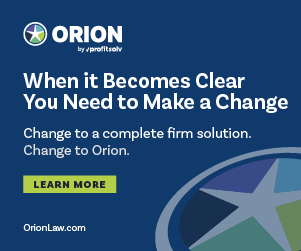“[Tools like ChatGPT are] there 24/7, available to everyone,” Grossman says. “I can see the real benefits for skill development. If I’ve never taken a deposition before, I can ask ChatGPT to take on a particular persona of a particular kind of witness and I can practice that.” While the bot isn’t going to tell you personal insights about people and processes at a particular firm, it could also be weeks before you can meet with someone there.
There are definitely shortcomings to asking a bot for professional advice, but it’s also a way to find potential answers in a pinch — especially if a mentor isn’t available. At the same time, law firms still need to find ways to support employees who are looking for a more personal mentoring experience without the in-office requirement. Here are a few approaches to consider.
LOOK BEYOND THE FIRM
According to a 2023 analysis by Bloomberg Law, nearly three quarters of attorneys with five or fewer years of experience have some sort of mentor in their professional life — but it’s unclear as to whether those mentor-mentee relationships are being formed within or outside of the workplace.
However, looking beyond the firm for setting up mentor-mentee relationships can be beneficial for employees who may have trouble discussing sensitive issues at work, whether it’s because they worry about facing retribution in exchange for their honesty or because they’re embarrassed about a situation, says Len Polsky, Manager of Legal Technology and Mentorship for the Law Society of Alberta.
“The challenge with internal mentoring programs is the mentee isn’t always comfortable sharing their thoughts,” Polsky says. For example, if they’re being bullied, they can’t necessarily go to the bully or the partner for advice. “It would take a leap of faith.”
This is where finding a mentorship program that connects legal professionals across firms can come in handy. Not only can this provide more candid experiences for both mentors and mentees, but it can also open up a wider selection of mentors and mentees to choose from, especially if participants are willing to meet in a remote format.
CONSIDER ALTERNATIVE OUTCOMES
Ryann Peyton, Executive Director for the Colorado Attorney Mentoring Program, an office of the Colorado Supreme Court that consults with law firms and legal organizations, says there is no one-size-fits-all approach to mentorship and that legal professionals are starting to look for different types of professional development outcomes. Here are a few:
Soft Skills Development: “Especially in the last five years, we’ve seen a shift in people wanting support in soft skills of being a legal professional,” Peyton says. They are looking for a more holistic growth opportunity, someone who can help them navigate challenging situations or not necessarily just a stepping stone into a job. “People want a cheerleader, people want someone who has their back.”
My mentor changed my whole career because he was able to see things in me that I had never considered as strengths that I might want to capitalize on.
Mentorship for All Legal Professionals: As the roles and types of legal professionals continue to expand, organizations like the Colorado Attorney Mentoring Program are working to build mentorship programs for licensed legal paraprofessionals. Taking into account the advancement of alternative legal service providers, or other staff who are new to your firm or corporate legal department, can help to create more equitable opportunities for mentorship.
Reverse Mentoring: Experts also talk about reverse mentoring as a way for more senior lawyers to gauge the needs and perspectives of more junior employees. According to Robert Half, reverse mentorship programs are an opportunity for more senior staff to acquire new skills from younger, more tech savvy employees.
TIPS FOR SUCCESSFUL FIRM MENTORSHIP
So now that we have a better idea of what employees are looking for in a mentorship program, how can law firms provide that to them? Let’s explore how firms and corporate legal departments can boost their mentorship offerings when employees aren’t necessarily getting in-office facetime.
Tip No. 1: Hire a Designated Employee
Whether your mentorship program is in-person, hybrid or remote, it has to be a priority for the firm or legal department. “It can’t just be a task that was dropped on human resources,” Peyton says. “It has to be somebody’s job to run the program or it will fizzle out.”
The challenge with internal mentoring programs is the mentee isn’t always comfortable sharing their thoughts.
Tip No. 2: Avoid Mandatory Mentorship
Participating in a mentorship program should be an opt-in experience. If you force employees into a mentorship program, it may not be rewarding for them or you may run into resistance with participation.
Tip No. 3: Ditch the Long-Term, One-on-One Approach
Provide opportunities for employees to meet through different channels that are best aligned with their needs and comfort levels. Remember: The goal is active participation.
While one-on-one mentorship may work for some, others may be looking for something with a more relaxed commitment. Consider alternative options like speed mentoring, virtual matchups or short-term mentorship placements. Organizations like the Colorado Attorney Mentoring Program, Law Society of Alberta or your state or province’s equivalent can probably provide guidance on where to start.
Tip No. 4: Take Advantage of Tech
Technology can be helpful in connecting remote workers, employees in different offices or those who don’t feel comfortable reaching out to an individual on their own. Whether your firm is using tech to allow for remote meetups, as a tool to help with matching and facilitation, or to track participation and outcomes, consider how proper integration can help to make the most of your program.
Tip No. 5: Consider a 360-Approach
Remember that law school students, interns and junior attorneys aren’t the only ones looking for mentorship opportunities. Consider other legal professionals at the organization in addition to senior staff and partners.
THE END GOAL
Whether your firm decides to establish a mentorship program, improve upon an existing one or outsource the responsibility, the end goal for participants should be relationship building. The format of the program shouldn’t matter as much as the relationship itself and learning how to build that foundation, Peyton says.





